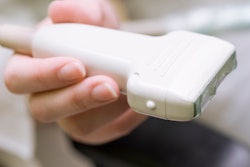
Emergency medicine providers who use point-of-care ultrasound (POCUS) don't face much medicolegal risk from their use of the technology, and they may actually be less likely to face malpractice suits, a study published August 8 in the Journal of Emergency Medicine found.
A team led by Dr. Brian Russ from the University of Arkansas for Medical Sciences found that most lawsuits related to POCUS allege failure to perform an ultrasound examination, with the technology's use in extended, emerging, and adjunct applications being more at risk of lawsuits.
"As emergency physicians have been enthusiastic adopters of point-of-care ultrasound, understanding the incremental change in risk as additional applications of ultrasound are adopted is critical for emergency physicians to make informed decisions about what applications best fit their personal risk tolerance," Russ et al wrote. "However, it is important to note the dominant source of risk identified in our data suggests that not performing an ultrasound is the primary source of risk."
The popularity of POCUS continues to grow thanks to its ease of use, cost-effectiveness, versatility, and image quality relative to conventional ultrasound.
While critics say that larger, prospective datasets are needed before POCUS becomes more widely used, the technology is also not immune to lawsuits. Previous studies suggest that not performing ultrasound is the primary source of an allegation of medical malpractice. The average cost to the defense in a case varies by resolution. Previous research notes an average of $25,996 for cases dropped, withdrawn, or dismissed, and an average of $41,033 overall.
"Historically, some providers have expressed reluctance to perform POCUS out of fear that this may result in the assumption of greater medicolegal risk," the Russ team wrote. "For this reason, some have advocated that obtaining consultative imaging from other services such as radiology and cardiology is a more legally sound practice insomuch that it shifts liability onto another service."
The research team wanted to update current literature regarding medical malpractice cases involving POCUS and its applications. The group also wanted to explore risks undertaken by advanced-practice providers when it comes to emerging applications of ultrasound.
The researchers looked at a total of 19 medical malpractice cases stored in the Westlaw legal database, all of which had to do with POCUS. The cases were filed between 2012 and 2021. Cases included allegations of misconduct by an emergency provider, as well as discussions of extended, emerging, or adjunct applications in ultrasound that are included in the American College of Emergency Physicians (ACEP) investigators core.
While seven legal cases were ultrasound applications that fell within the ACEP core applications, 13 involved ultrasound applications that ACEP recognizes as extended, emerging, or adjunct. One legal case fell into both categories.
The team found that failure to perform an ultrasound study was the most common primary allegation among all cases, with 10 cases. They also reported that the most common examination type involved was a venous duplex examination (n = 5) followed by testicular ultrasound (n = 3).
The researchers also found no cases of litigation that clearly resulted from misinterpretation of POCUS studies.
The study authors wrote that their findings coincide with previous research and suggested that performing an ultrasound may protect against nonperformance allegations in malpractice lawsuits.
"No cases in our study clearly related to an inappropriately performed or inaccurately interpreted POCUS," they noted.
Russ and colleagues added that using consultative imaging with other medical specialties rather than POCUS may not mitigate the risk of emergency physicians from being sued, with four such cases listed in the study.
They also wrote that these results, as well as other research on this topic, could help with understanding the barriers to POCUS' use. They added that such research could benefit healthcare systems by reducing costs and increasing efficiency by using POCUS more.




















